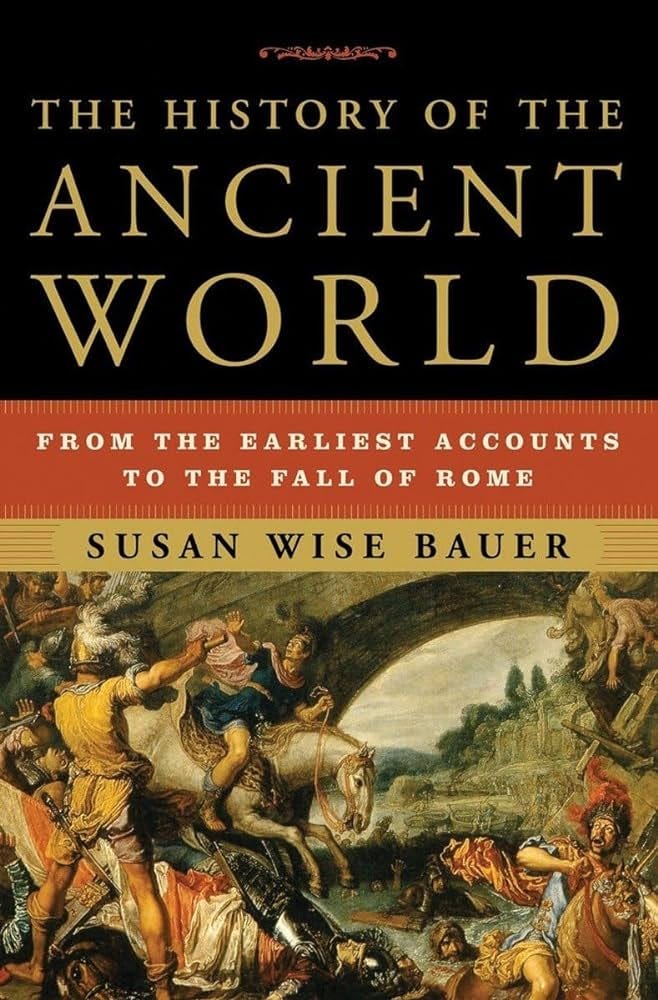The History of the Ancient World: From the Earliest Accounts to the Fall of Rome
A book review
Knowing history is knowing humanity.
If that statement is true, then heaven help us.
The History of the Ancient World: From the Earliest Accounts to the Fall of Rome is a book that, as its title suggests, deals with Ancient World History. The author, Susan Wise Bauer, offers a panoramic view of the rise and fall of the cultures that have existed in the Middle East, Europe, China, India, and Egypt. Following a chronological order, the narrative jumps from civilization to civilization, showing how these empires interacted with each other.
Starting with Mesopotamia and Egypt, the book ends with Constantine’s conversion to Christianity. You might wonder why it stops there, given that the title suggests it covers up to the fall of Rome. The reason is that the author argues that with Constantine’s conversion, the Roman Empire as such ceased to exist. Rome continued to exist, but in a radically transformed way.
I’ve never been much of a fan of history, perhaps because in school it was a real bore, and I couldn’t see how it applied to my life. It’s taken more than a decade for my curiosity, which always expands, to peek into our past.
It’s been a chilling surprise. Human beings are a mess. If there’s one thing I’ve learned in the 700 pages of this book, it’s this: being a king is a bad business. Violent death at the hands of your family and friends is almost guaranteed.
Of course, it’s even worse to have no power at all. Ordinary men and women were subjected to continuous military campaigns, where savagery was assured. I’ve lost count of the times I read, “the inhabitants of the city were massacred.”
The reading is engaging, quick, and often amusing. Susan Bauer has a great knack for irony, which is appreciated when recounting such gruesome events as those in this work. Rarely did the reading feel tedious, except for the occasional list of minor kings who quickly succeeded one another.
One thing I missed was a discussion of the religious and cultural aspects of these civilizations. You won’t find much about the beliefs of these people, barely anything about their artistic production, and even less about the day-to-day life of common folk.
For me, at least, these are the most interesting aspects of history. I finished the book with a broad understanding of the succession of powerful men and the conquests they carried out, but don’t ask me how the life of an Egyptian in the Old Kingdom differed from one in the New Kingdom.
This point, which is significant, makes my final rating of the book a 3.5 out of 5. The work is very good at what it does, but I found it frankly lacking. Searching online, I came across a series by Will Durant that seems to explain these cultural aspects in much more detail, and I will definitely take a look.
I always like to note three impressions I take away from a reading.
- First, neither Rome nor Greece were political beacons of enlightenment amid barbarism. Intrigues, assassinations, and massacres were as present as in seemingly more autocratic civilizations. I found it very interesting how the Roman Senate was willing to submit to the power of the emperors to avoid civil wars — something that ultimately failed. I wonder whether they were forced by a lack of power or if it was a pragmatic decision. I’m more inclined to believe the former.
- Second, the most successful reigns were the peaceful ones. Culture and wealth flourish when military incursions are kept to a minimum. This would be encouraging if not for two reasons:
— One: these periods only came after great conquests.
— Two: they inevitably resulted in a loss of power and territory to other kingdoms or more warlike internal factions, resuming the usual barbarism.
It’s revealing, but certainly not reassuring.
- Third and final impression, the ancient world was much more interconnected than I had imagined. Political, commercial, and military relations between different civilizations have been a constant from the beginning.
As for the format, you can find the work in both traditional form, with about 700 pages of actual reading (900 pages with notes), and as an audiobook, with a length of just over 26 hours. If you want to gain a global view of Ancient History and don’t care too much about the cultural aspects of the civilizations covered, this book is suitable.
I’ll continue reading the other two books by Susan Bauer, dedicated to the Middle Ages and the Renaissance, because I’ve enjoyed this one a lot, but with the awareness that I’ll need to fill in this gap in the future.


